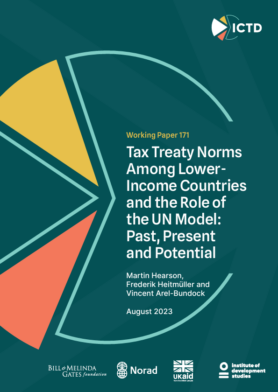Working Paper 171
Bilateral tax treaties draw heavily from model conventions published by international organisations. In this paper we investigate the influence of the UN model on tax treaties signed by lower-income countries, as well as the potential for specific model provisions to be mainstreamed in a greater number of treaties. Despite its focus on the interests of lower-income countries, the UN model is often assumed to play a minor role compared to the OECD model. Drawing from an updated version of the ICTD Tax Treaties Explorer dataset, we find that a subset of UN model provisions can already be considered as the norm in treaties concluded by lower-income countries. Among the provisions now uniquely found in the UN model, these are the inclusion of ‘supervisory activities’ in article 5(3)a, and the whole of articles 5(3)(b) and 14. The prevalence of many UN articles is increasing, suggesting that more provisions could join these three. The influence of the UN model becomes even more apparent when we focus on the amount of bilateral investment into lower-income countries that is taxed according to UN model provisions. To assess the avenues for further change we study countries’ reservations to model conventions, as well as their recent negotiation history. This allows us to identify those provisions that are most likely to be strong priorities for lower-income countries, and acceptable to a large number of partner countries. In particular, UN articles 5(4)(b), 5(6) and 21(3) are all increasing in prevalence, have strong support from lower-income countries expressed as observations on the OECD model treaty, and show significant renegotiation potential from recent country-level precedent. Overall, we find that there is significant scope for lower-income countries to renegotiate treaties with a view to obtain more rights to tax income at source.
